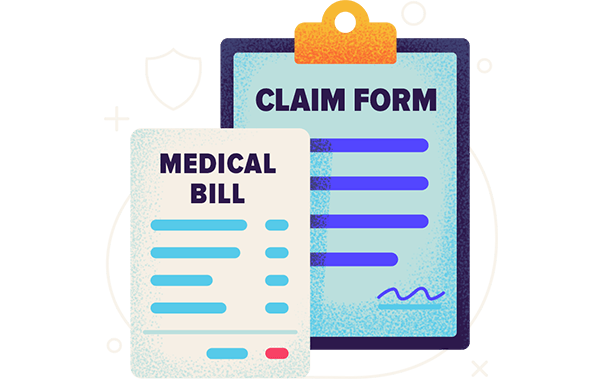A bodily injury claim is a request for compensation for expenses related to physical injuries sustained in a car accident. Bodily injury claims usually cover medical bills and lost wages, and these claims can be paid by either the injured party’s insurance company or the at-fault driver’s insurance.
Key Things to Know About Bodily Injury Claims
- The process of filing a bodily injury claim after an accident depends on the state and who is at fault.
- Most states allow people involved in accidents to file bodily injury insurance claims against the at-fault driver.
- No-fault states require drivers to use their own insurance to pay for their medical bills after an accident, though lawsuits are allowed if costs exceed a certain amount.
- When filing a bodily injury claim, you should hire an attorney and document all expenses.
- Getting treatment immediately and accounting for the full impact of your injuries will make the bodily injury claims process easier.
How to File a Bodily Injury Claim
1. Get A Lawyer
Having an attorney represent you when you file a bodily injury liability claim can make the process much easier, especially if you suffered a serious injury. An attorney can help you with documentation and negotiating the claim settlement. Most personal injury attorneys will represent you on a contingency basis, meaning that they’ll only be paid if your claim is successful.
2. Keep All Medical Documents
In order for your bodily injury claim to be successful, you have to be able to prove that you suffered your listed injuries and received the appropriate treatment. Anything from medical bills to doctors’ reports and test results will help prove the validity of your claim.
3. File the Claim
Depending on your state and the circumstances of the accident, you will file the claim with your insurance company or the other driver’s. After filing, you will be contacted by an insurance adjuster. They will be the person to take all of the evidence related to the accident, including your medical documents, and come to you with a settlement estimate.
When you file a bodily injury liability claim, you should be prepared to provide the following information:
- A detailed description of what happened
- Photos of the scene and any injuries you sustained
- Medical records
- Receipts related to all medical expenses
- Proof of lost wages
4. Review and Sign the Settlement
Once the adjuster comes back to you with a settlement offer, you should have your attorney look it over prior to signing. Keep in mind that you should also consider any future expenses that might arise as a result of your injuries.
If the offer is satisfactory, you will sign the settlement, thereby stating that you will not pursue any further payment. If your claim is denied, the insurance company will have to give you a specific reason. If you think that your claim was denied illegally, or if your offer is insufficient and negotiations aren’t successful, you will need to consult with your attorney about potentially beginning legal proceedings.
When Can You File a Bodily Injury Claim?
You can file a bodily injury claim when you are injured in a car accident. In almost every state, drivers are required to carry a certain amount of bodily liability insurance that pays for injuries to others in accidents that they cause. The exact coverage requirements vary between states, but every liability policy will include a dollar limit for how much the insurance company will pay per injured person and per accident.
However, unlike property damage claims, seeking compensation for bodily injury can be a complicated process depending on where you live and who caused the accident.
If You’re At Fault for the Accident
If you sustain injuries in an accident that you cause, then your bodily injury liability insurance will not cover any of your medical costs. Instead, you need to use personal injury protection (PIP) or MedPay coverage, both of which pay for your medical expenses after an accident regardless of fault. They are usually optional levels of coverage, although several states require them.
If you don’t have PIP or MedPay, you will have to rely on your regular health insurance to cover your medical costs.
If the Other Driver Is At Fault
In cases where the other driver is at fault, their bodily injury liability insurance will pay for your medical expenses. However, if the driver is uninsured or doesn’t have enough insurance to cover your costs, then you will have to file a claim with your own uninsured/underinsured motorist coverage.
This coverage is optional in most states, but it’s always good to have in case you’re involved in a serious accident and your medical bills exceed the other driver’s liability limits. If you find yourself dealing with an uninsured/underinsured driver and you don’t have uninsured/underinsured motorist coverage, then you can use PIP or MedPay. But if you don’t have either of those, then your health insurance will have to pay for your costs.
If You Were Partially At Fault
When you share responsibility in the accident, your ability to get reimbursed for your expenses is going to depend on your state’s laws regarding negligence.
- Comparative Negligence States: The other driver will cover your expenses based on their degree of responsibility for the accident. For example, if they were 75% at fault, their insurance company will pay up to 75% of your medical expenses. There are 12 pure comparative negligence states.
- Modified Comparative Negligence States: You may not recoup expenses from the other driver if you were more than 51% at fault. There are 33 modified comparative negligence states.
- Contributory Negligence States: If you bear any responsibility for the accident, you cannot have your expenses covered by the other driver’s insurance. There are five contributory negligence states, and it is also used in the District of Columbia.
If You Live in a No-Fault State
There are 12 no-fault states that require every driver’s insurance company to pay for their policyholder’s expenses after a car accident, regardless of who is at fault. No-fault states require drivers to carry PIP coverage in order to prevent small claims from going to court and allow drivers to be quickly reimbursed. So, if you live in a no-fault state, you file a bodily injury claim with your insurer, not the other driver’s insurance.
You can still sue the at-fault driver for bodily injury in a no-fault state, but only if your injuries are severe or you have incurred substantial financial loss. Each state has its own threshold for when an at-fault driver can be sued. For example, while Massachusetts allows drivers to file suit if they have incurred medical expenses exceeding $2,000, Hawaii only allows it after $5,000.
Tips for Filing a Bodily Injury Claim
Some bodily injury claims are more straightforward than others, and some factors will be out of your control. But there are some steps you can take to make sure there are fewer bumps in the road.
Get Treated Immediately
Don’t wait until after you file a claim to receive treatment, as this could lead to further medical complications later on. Even if you feel fine, you might have injuries that aren’t immediately obvious. Be on guard for any new symptoms and keep your doctor informed of your situation just in case a medical problem arises later on and you need to file a bodily injury claim.
Document All Effects of Your Injuries
The type of injuries that you sustain in a car accident will have an effect on your compensation. For example, a broken arm doesn’t have the same long-term impact as a spinal injury. The more detailed your medical reports and documentation are, the more successful your bodily injury claim will be.
Your final settlement should reflect all costs related to your injuries, not just medical bills, so you need to anticipate the financial hurdles you could face later on. These might include loss of future wages due to an inability to work or the costs of re-equipping a home to accommodate a resulting disability.
Watch Out for Unnecessary Medical Bills
Sometimes doctors will run unnecessary tests after an accident because they know that the insurance company will pay for it. But insurance adjusters know the general medical standards for testing and treating injuries related to car accidents. Therefore, they will only authorize payments for medical treatments that they deem reasonable and necessary.
You’ll be responsible for paying off any medical bills not covered by your insurance, which could pose a massive financial burden. So if you are not in an emergency situation, make sure that you are asking questions and that you fully understand what tests and treatments you need to receive.


WalletHub experts are widely quoted. Contact our media team to schedule an interview.